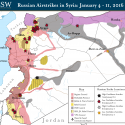 |
 |
Russian Airstrikes in Syria: January 4 - 11, 2016
Jan 12, 2016 - Genevieve Casagrande

Low-Confidence reporting. ISW places low confidence in secondary sources that have not been confirmed or sources deemed likely to contain disinformation.

Russia expanded efforts to portray itself as a neutral actor in Syria ahead of the next round of negotiations by claiming to support tailored elements of the Syrian armed opposition. The Russian Ministry of Defense (MoD) reiterated during a press briefing on January 11 that “only joint efforts” by the Syrian regime and select Syrian opposition groups will “achieve victory over terrorism” in Syria, despite Russia’s continued targeting of armed opposition factions. The Russian MoD claimed that Russian warplanes are currently conducting strikes supporting ground operations of 11 opposition factions, which the Russian MoD described as “Syrian patriotic forces.” Alleged recipients of Russian air support primarily consist of groups supported by the U.S. such TOW anti-tank missile recipient Jaysh Asoud al-Sharqiya, an anti-Assad opposition faction that has previously accused Russia of targeting their headquarters in the Damascus countryside. Russia claimed to conduct strikes “in the interest of” Jordanian-backed opposition group Jaysh Ahrar al-Asha’er in the villages of al-Taf and Khosh Hammad in Dera’a Province, areas where the group is currently clashing with ISIS. Local reporting, however, did not verify Russian strikes in the area. The Russian MoD also reported strikes supporting U.S.-backed Syrian Democratic Forces’ anti-ISIS ground operations near Ayn Issa north of ar-Raqqa City. Local reporting indicated a limited number of Russian airstrikes occurred in the area, although it remains unclear if the Syrian Democratic Forces benefitted from these strikes. Russia is overstating and, in some cases, fabricating its efforts to support armed opposition groups in Syria. Russia aims to use this disinformation to obfuscate its position as the regime’s guarantor against the armed opposition and present itself as a legitimate mediating actor ahead of negotiations. Russia also seeks to demonstrate that it does discriminate between opposition groups in order to position itself as an authority in determining which parties are able to participate in negotiations. In tandem with airstrikes against other armed opposition groups, these efforts also ultimately aim to disrupt the U.S.’s partnerships inside Syria.
Russia continues to target critical infrastructure and inflict heavy civilian casualties in Syria. French Foreign Minister Laurent Fabius demanded the cessation of Russian and Syrian airstrikes on civilian locations on January 11, calling any such strike “inadmissible.” Russian strikes in Idlib Province resulted in 81 casualties, at least 22 of which were civilians, in a January 9 attack against a Jabhat al-Nusra prison in the town of Ma’aret al-Nouman. Local sources also reported that Russian strikes targeting three schools in the town of Anjara in Western Aleppo on January 11 killed as many as 35 civilians, including 17 children. Russian warplanes reportedly also targeted both a hospital and a relief warehouse in the Jebel Turkman Mountains of Northwestern Syria. The Syrian opposition demanded further confidence building measures from the regime ahead of negotiations to include the cessation of Russian airstrikes in Syria, stating that talks are not feasible while “there are foreign forces bombing the Syrian people.” The regime, however, remains unlikely to grant any such concession as Russian air operations have ensured the preservation of the regime and its superior position on the battlefield.
The following graphic depicts ISW’s assessment of Russian airstrike locations based on reports from local Syrian activist networks, Syrian state-run media, and statements by Russian and Western officials. This map represents locations targeted by Russia’s air campaign, rather than the number of individual strikes or sorties.
High-Confidence reporting. ISW places high confidence in reports corroborated both by official government statements reported through credible channels and documentation from rebel factions or activist networks on the ground in Syria deemed to be credible.
Low-Confidence reporting. ISW places low confidence in secondary sources that have not been confirmed or sources deemed likely to contain disinformation.